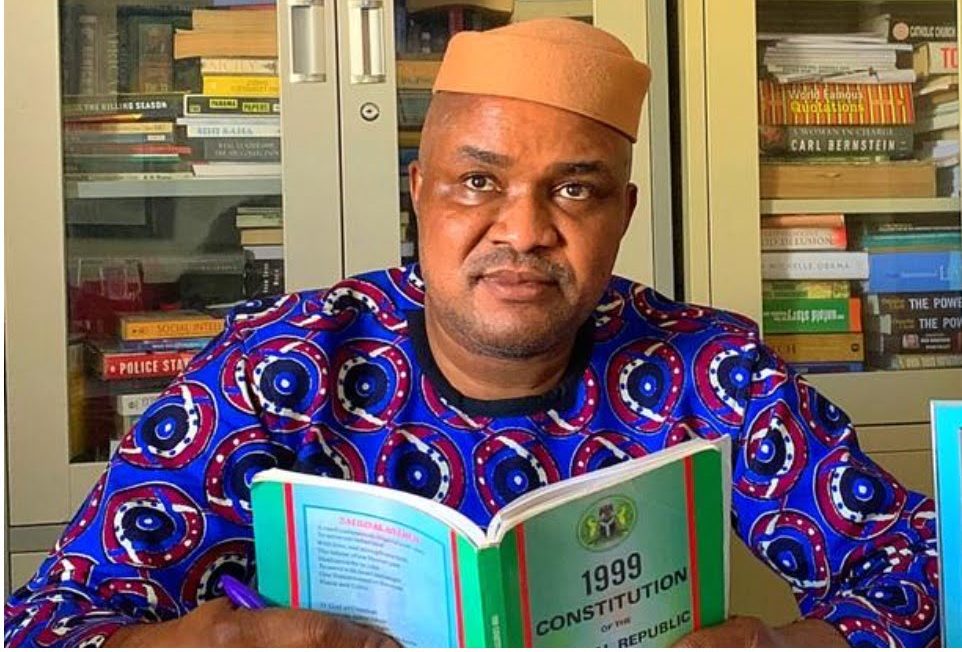Senator Rochas Okorocha is one whose personality is shrouded in uncertainties. His eloquence and oratory has always marked him out. As a gifted demagogue with particular skill in manipulating the press, Okorocha rhetorically exploits situations for political capital in a way calculated to appeal to the desires and prejudices of ordinary people.
As Imo governor and lord, he gained much of this popularity in his government by exploiting prejudice and ignorance to arouse the common people against elites, whipping up the passions of the crowd and shutting down reasoned deliberation. But did he last in that web of lordship? No. The rest in this category is history.
However, the senator’s mien has made it almost impossible to see him from the prisms of selflessness and common good. That not withstanding, we cannot wish him away in all matters as he has once more starred the honest nest. Last week Thursday, Senator Rochas Okorocha canvassed for the reduction of parliamentarians representing each state of the federation, saying the nation cannot afford their expenditure anymore.
Okorocha, a former Governor now representing Imo West Senatorial District, stated this while contributing to a Committee report on MTEF at the Senate’s midweek plenary. He faulted the bicameral legislature, saying that there was nothing too sacrosanct that Senators and House of Representatives members were doing that only senators could not do. Ever since Okorocha dropped this beat, media houses have had their field play.
Obviously, the need for government in civil societies has received numerous positive supports over the centuries and this has been proved through various theories in political thoughts. For any society to prosper, it needs to have a government to run its affairs. The government helps to sustain the social contract that binds every member of the state.
However, many Nigerians have decried the situation where costs associated with the running of government have dramatically increased over the years such that an increasingly reduced proportion of public revenue is available to support and implement the primary functions of government. This situation has led many Nigerians to believe that the road to transformation and salvation may still be long and tortuous, more so because governments at all levels are ignoring the need to cut cost.
The over-bloated nature of Nigeria’s administrative system was one of the issues the Presidential Advisory Council (PAC) harped on before it was dissolved in 2010. Recall that the Council under the chairmanship of Theophilus Yakubu Danjuma; a retired general had asked President Jonathan to cut down the number of ministries, departments and agencies to free resources for other productive uses instead of paying salaries of civil servants alone.
The Danjuma-led PAC noted that the federal government has, since 1999, spent N15.6 trillion on public servants alone. A year later, Hamman Tukur; the former chairman, Revenue Mobilization, Allocation and Fiscal Commission, also disclosed that the country spends N1.3 trillion yearly on the emoluments of the federal government, 36 states and 774 local councils’ political, public and judicial office holders. There was no doubt that the council was speaking the mind of many Nigerians and in line with the principle of justice and equity.

This debauchery is as well seen among state governors who waste public money on large armies of commissioners, special assistants and assistants ostensibly as aids to advise on virtually every issue under the sun. For instance, most of the states have an average of between 13 and 29 commissioners and a coterie of special assistants.
Rochas Okorocha in particular who was Imo State Governor, led the over bloated pack with 66 special assistants, some of them handling portfolios as ridiculous as special assistants on Igbo affairs, Orlu Zonal Security, Lagos Affairs and Chief Comedian of the state. In fact, Imo State had a total of 83 aids working for the governor.
By these appointments, the governor and his allies gave the impression that they were exercising powers conferred on them under Section 14 (4) of the constitution which stipulates that the composition of the government of a state or local council (and their agencies) “shall be carried out in such manner as to recognize…the diversity of the people within its area of authority and the need to promote a sense of belonging and loyalty among the peoples of the federation.”
Although this section and section 192 dealing with the appointment of commissioners are not categorical about the number of such aids, it is envisaged that political players, taking into consideration the resources of the states, would operate within the limits of reason and do what is right, just and defensible.
It is obvious that the presidency and state powers seem to be running a circus featuring men and women who had helped them to power, and by so doing, they would be unwittingly reducing governance to a pedestrian and irresponsible affair, thus amplifying the letter of the constitution to the detriment of its spirit. This speaks volumes about a misplacement of priorities by those who are supposed to govern the people in a country where it is difficult to pay a minimum wage of N30, 000 to civil servants.
According to projections, the average lawmaker in the National Assembly takes home about $1.2 million or about N186 million per annum, excluding a severance package in millions of naira. In fact, members of the Nigerian Senate and House of Representatives earn more than the President who takes home N1 million a month, an amount considered still very high in a country where the minimum wage was grudgingly raised to N30, 000 a month.
The cost of running our bloated cabinets of about 1, 411 members, at both federal and state levels only stand at the piercing rate of over N64 billion in four years. This is, no doubt, a very conservative estimate that excludes other perks for the politicians in a country like Nigeria ravaged by grinding poverty.
By sheer estimation, it will cost Nigeria three hundred and thirty-eight billion, six hundred and forty-five million, eight hundred and forty-five thousand, five hundred and ten naira (N338, 645, 845, 510 bn) in taxpayers’ money to keep the 469 members of the National Assembly in office for four years.
This amount which covers salaries and sundry allowances to be earned by the lawmakers does not, however, factor in the deferential pays and other prerequisites that go to the principal officers of the two chambers of the federal legislature. It does not also include expenses incurred on duty tours and frivolities.
What this means is that when the huge cost of governance as a result of waste is added to the increasing cost of corruption and other vices in the country, the common man in Nigeria is not likely to feel the impact of government till eternity. It is sad that in Nigeria, what operates is a system without a social conscience, a sort of primitive, beggar-my-country capitalism where the average citizen is preyed upon, enjoying almost nothing from the commonwealth.
Okorocha’s submission is not new to us. He has only reinstated the obvious, an obnoxious charade which himself is a senior beneficiary. He who comes to the table of Justice must come with clean hands. The huge fraudulent allegations against him in Imo State is more harmful than the cost of entire government. He cannot be exempted from the accusations leveled against those who have wrecked and pillaged this nation.
The ruins he leftover in Imo State are quickly starring at him. In a decent society, people of his mold and that of T. A. Orji of collapsed Abia State should never have the moral temerity of approaching the hallowed chambers. Rather than suggesting cutting the number of Assembly members, the senate ought to make a law forbidding former governor’s from being senators. Until such decisive measures are taken, Okorocha’s suggestion will only be a mere wink in the tin dark night.
Script CREDIT: @DanUGWU




I don’t even know how I ended up here, but I thought
this post was great. I do not know who you are but
certainly you’re going to a famous blogger if you aren’t already
😉 Cheers!